Published on
Updated on
Across the Missouri Agricultural Experiment Station (MOAES), faculty are cultivating not just plants and livestock, but a brighter future for generations to come. That means not only continuing the research that helps nourish people across the globe but also tending to and growing the facilities that help make that research possible. Over the last two years, MOAES has been able to make major investments in its infrastructure to facilitate future discoveries and ensure its legacy for the scholars of tomorrow.
The Roy Blunt Soil Testing and Research Laboratory at Fisher Delta Research, Extension and Education Center will strengthen research support for southeast Missouri producers.
PARTNERS: Federal, state and local government; MU Extension; Missouri Soybean Association
Construction of the 6,200-square-ft. Roy Blunt Soil Testing and Research Laboratory at the University of Missouri’s Fisher Delta Research, Extension and Education Center (FD-REEC) in Portageville, Mo., began in the spring of 2024.
This $4.6-million facility will enhance agriculture research programs housed at the center, offering advanced resources for soil, water and plant-tissue testing.

“The addition of this laboratory at the Fisher Delta REEC will be crucial to enhancing the quality of research conducted at the center, thus enhancing the agricultural production and profitability of Missouri farmers,” CAFNR Vice Chancellor and Dean Christopher Daubert said.
The new building will offer technologically advanced soil sample and water and plant-tissue testing and provide lab space to house the FD-REEC’s rice production and entomology research programs while accommodating additional greenhouse operations. The testing services to be offered by this new laboratory are currently unavailable in this region of Missouri.
“The significance of this new facility for Missouri’s farmers cannot be emphasized enough,” said Chad Higgins, vice chancellor for Extension and Engagement and UM System chief engagement officer. “MU Extension’s Soil Testing Program serves as a cornerstone in supporting Missouri farmers by delivering critical insights into soil health and nutrient management. Through its science-backed recommendations, this program annually contributes to savings exceeding $60 million for Missouri farmers, resulting in reduced fertilizer expenses and enhanced crop yields.”
Former Sen. Blunt was integral in bringing together federal, state and local funding sources to build the new facility.
New building at Mizzou’s Horticulture and Agroforestry Research Farm to support research, teaching and extension efforts in mid-Missouri
PARTNER: USDA
A new building at the University of Missouri’s Horticulture and Agroforestry Research Farm (HARF) in New Franklin will upgrade the ability of the farm to host educational and outreach events, and support the local community, including producers and landowners.
HARF is part of CAFNR’s Central Missouri Research, Extension and Education Center (CM-REEC), and, up until now, has not had indoor space to host events, educational opportunities and outreach demonstrations.
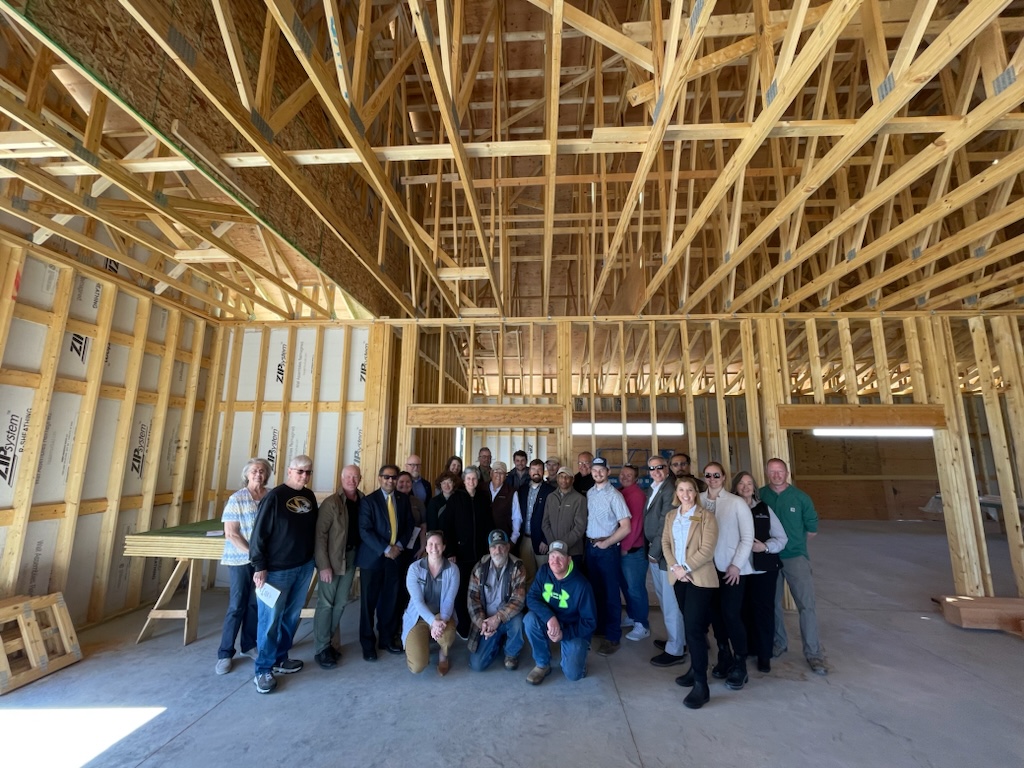
“We are thrilled to be coming to completion on this important building project,” said Dusty Walter, director of the CM-REEC. “We have top-level research going on at this property, and have not had a place to hold events to showcase the research and opportunities it creates for Missouri.”
The building will include offices for HARF faculty and staff, as well as kitchen and meeting space for events (with a capacity of 85). The Learning Center will provide indoor space for teaching students, whether from Mizzou or local schools, as well as for workshops and demonstrations about the property’s research.
“This project is a culmination of efforts over time,” said Christopher Daubert, vice chancellor and dean of CAFNR. “We are excited to finally be able to be a hub for local events, educational opportunities and more.”
HARF is the primary research site for the University of Missouri Center for Agroforestry (UMCA), a CAFNR Program of Distinction. The farm includes numerous experimental fruit (peach, pawpaw, elderberry) and nut orchards (chestnut, black walnut, northern pecan, ‘Bucks Unlimited’TM oak), in addition to agroforestry research and demonstrations, such as forest farming, riparian buffers, silvopasture, alley cropping and windbreaks. Other projects include forage shade trials, flood-tolerance trials, biofuel trials and pinestraw production trials.
Expanding Opportunities: Eldon Cole Livestock Facility nears completion at MU’s Southwest REEC
PARTNER: MU Extension
The University of Missouri’s Southwest Research, Extension and Education Center (SW-REEC) is poised to offer more public education and research opportunities with the addition of a state-of-the-art livestock handling facility expected to be completed by the end of summer 2024.
“This one building is going to offer an incredible expansion of educational opportunities for our students, researchers and the community,” said Christopher R. Daubert, vice chancellor and dean of CAFNR. “Here, our students will get more hands-on learning experiences, and our researchers will have the best infrastructure to allow them to focus on what they do best — world-class research that is applicable on working farms throughout Missouri and moves the livestock industry forward.”
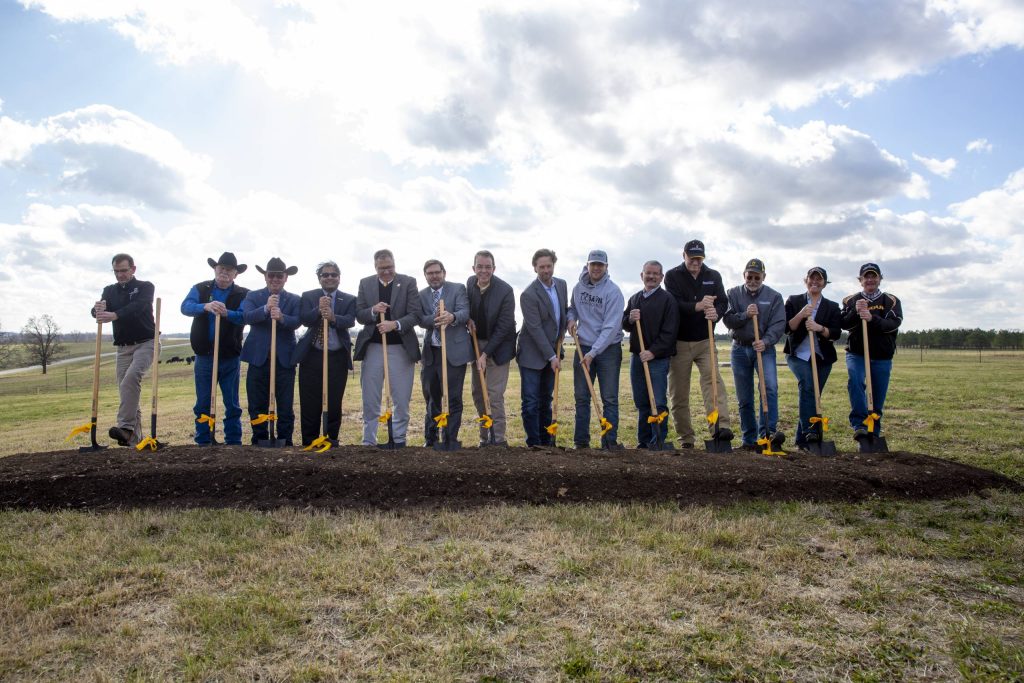
The facility, which sits on the portion of the REEC north of I-44, will offer an indoor space for breeding activities like pregnancy checking, healthcare procedures such as vaccinations, and research data collection like blood draws. It will also feature an observation deck and add basic amenities like restrooms that do not currently exist on the portion of the nearly 900-acre REEC that sits north of I-44.
In addition to conducting research, MU Extension uses Southwest REEC facilities to provide community education that helps area farmers improve practices and make their own farms more productive and profitable.
“This is going to make our farm and our programs so much more accessible to the public,” said Jay Chism, director of the SW-REEC. “As a land-grant university, the ability to bring the knowledge of our researchers and faculty to the hard-working farmers of southwest Missouri is truly rewarding, and this facility will make even more of that work possible.”
Chism looks forward to offering classes through MU Extension to area farmers that the REEC currently cannot support. These would include topics like artificial insemination in which a live demonstration would be key to learning.
Missouri Foundation Seed moving forward with modernization project
PARTNERS: Missouri Soybean Association, State government
In 2023, Missouri Foundation Seed (MFS) received a $3.25 million appropriation from the State of Missouri to modernize its facilities and, ultimately, be more competitive with other states. Today, MFS is hard at work implementing that project.
MFS was established in 1944 as an avenue for the University of Missouri to take new plant varieties created by CAFNR researchers to market while also providing the highest quality seeds to Missouri farmers.
The modernization project includes a complete renovation of MFS’s seed cleaning facility, and construction began spring 2024. It is slated to be completed by the 2024 harvest.
One of the more impactful investments — a new combine — has arrived and was put to use for harvest in the fall of 2023.
“What we had been using was a typical commercial combine,” explained Jeff McHugh, MFS director. “This combine is designed for foundation seed operations, and it is going to make an enormous impact on our efficiency during harvest season.”
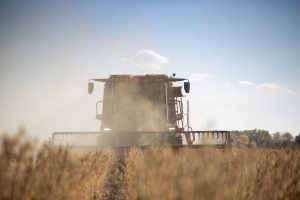
The difference lies in the cleaning mechanisms of the combine. On a commercial soybean farm, the producer is typically harvesting large quantities of one variety of soybean at a time, but on a foundation seed operation, workers are harvesting smaller amounts of dozens of varieties of soybeans — and the combine has to be cleaned between each variety to prevent cross contamination.
Sean Black, manager at MFS, explained that the cleaning process of a traditional commercial combine takes about eight hours and involves a lot of water. This is particularly problematic when the harvest season stretches into December, and it often has for MFS due to the inefficiencies of the cleaning process.
“This is really a very dirty job,” Black said. “It’s a job that you do because you are passionate about research and you are passionate about helping producers of Missouri-grown products.”
With the new combine, the cleaning is pneumatic — uses compressed air rather than water — and only takes about two hours. This means not only better working conditions for those helping with the harvest, but also completing harvest earlier and reducing bean spoilage.
“By fall 2024, our entire operation is going to be safer and more efficient,” McHugh said. “It’s really going to allow us to serve Missouri farmers in bigger, better ways.”
Grant to expand water testing capabilities for northern Missourians
PARTNER: USDA
The University of Missouri’s Northern Missouri Research, Extension and Education Center (NM-REEC) expands across the Mark Twain watershed — a drinking source for more than 85,000 Missourians — and thanks to a grant from the U.S. Department of Agriculture Rural Development, it will soon be able to help monitor water quality in the area better than ever before and at a lower cost.
The $150,000 grant will cover the equipment costs to build a water quality lab on the property, which brings many advantages both for Missourians living in the area and for academic pursuits.
“We have been shipping soil and water samples outside because we didn’t have any way of testing it here,” said Gurbir Singh, assistant professor of applied soil science in the Division of Plant Science and Technology, and state extension specialist in soil science, who is managing the project. “We are in the Mark Twain watershed, and this grant funding will allow us to offer water sample testing to the community at a lower rate.”
Singh expects the lab to cut costs dramatically — possibly saving the university as much as $140 per sample.
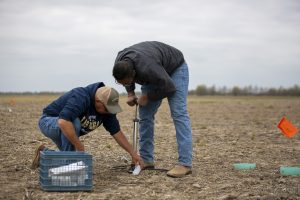
Singh lives on the property at Lee Greenley Jr. Memorial Farm with his family and diligently monitors his research at the farm including water quality monitoring projects that require him to take samples immediately after rains. Having the lab onsite will expand his capacity to carry on the environmental monitoring projects and answer more questions about water management for area producers.
“We are going to be able to do more types of testing,” Singh said. “Ammonia, for example, has to be tested within a day of sample collection, so right now, we can’t do that at all.”
The lab will also improve the reliability of the information Singh is using in his research as he will have more knowledge and control over the testing process.
“Once the sample is out of our hands, we don’t know what is happening with it because every lab has its own protocol,” he said. “This will strengthen the quality of the research and the quality of the sample analysis.”
Singh is well-versed in water testing procedures because he was fortunate to have hands-on learning in a water testing lab during his own graduate training, and this is another benefit he hopes to see the lab provide to University of Missouri graduate students.
Each year, dozens of University of Missouri graduate students have access to the farms within the REECs to conduct research, and this facility will provide the opportunity to learn a new skill set in testing their own water samples.
The future of the Meat Industry at Mizzou
PARTNER: State government
From its roots as the first land-grant university west of the Mississippi, Mizzou has evolved to become a national leader in animal and food science research. In Missouri, where agriculture is the state’s top economic driver, investments in university infrastructure translate to better products, a trained workforce, improved technology and best practices for producers, processors and consumers.
Together, Mizzou and Missouri are building a world-class meat science laboratory on the university’s campus. A generous investment by the state to replace MU’s current abattoir and meat market facilities has opened the door to a new state-of-the-art facility devoted to education, training and research to house and capitalize on the strength of MU’s meat science program. Beyond the processing floor and a retail storefront, we envision lab space, a classroom space and faculty offices to build the state’s only working and teaching laboratory for everything from the farmgate to the consumer experience. This is where the next generation of Missouri meat processing will begin.
Beyond its function as a processing facility, the Meat Science Lab will serve as a site to train future and current workforce in the latest technology and best practices, strengthening the industry in Missouri.
The new facility will also feature a premier retail space featuring MU and Missouri products that will serve the community as the processing laboratory exposes future meat scientists to the latest advancements in agribusiness, food safety, manufacturing and packaging technologies.
Making blueprints for tomorrow’s energy needs: MU’s Center for Energy Innovation
PARTNERS: MU College of Engineering, MU College of Arts and Science
MU’s Center for Energy Innovation is a new interdisciplinary project that aims to bring scientists together to find sustainable ways to advance energy production and discover new energy innovations.
Through the Center for Energy Innovation, the University of Missouri is committed to tackling challenges presented through rising energy concerns and rapid growth in artificial intelligence and how the two work together to optimize energy production, transmission and grid security. The $160 million, 180,000-square-foot facility, which is expected to open by 2027, will bring together engineers, agronomists, physicists, chemists and public policy experts to provide sustainable solutions for the future and strengthen domestic energy supply.
Levels of the new center will be dedicated to nuclear energy and nuclear-engineered materials; hydrogen and renewables; energy storage; and grid security, resilience and innovation alongside public policy. CEI joins a growing tradition at Mizzou — similar to the NextGen Precision Health initiative — of bringing experts in different disciplines together for collaborative innovation. The College of Engineering, the College of Agriculture, Food and Natural Resources, and the College of Arts and Science stand together at the convergence of their faculty and research expertise with the Center for Energy Innovation.
From lab to clinical trials: Missouri Institute for Biomedical Research & Innovation
PARTNERS: National Institute of Health, MU School of Medicine
Animal models are foundational to developing safe and effective medical treatments, and swine models can be ideal for many studies due to their size and physiological similarities to humans. Pigs are already a preferred model for research including heart disease, metabolic disease (obesity, diabetes), device research and a potential source for organs. However, a bottleneck for wide-scale use of pigs is a lack of both physical and intellectual infrastructure.
To address this key national need, the University of Missouri (MU) is establishing the Institute for Biomedical Research and Innovation. MU is already home to the National Swine Resource and Research Center (NSRRC) – the only NIH-funded center for establishing and providing pig models in the United States. Additionally, MU also hosts a large animal testing center to test genetic therapies in pig models, as well as the Roy Blunt NextGen Precision Health building, which accelerates health innovations in an interdisciplinary setting.
Leveraging Mizzou’s existing strengths, and to address the current gap in performing preclinical research in pigs, the newly minted institute will boast facilities to house animals, as well as advanced equipment to validate genetic models and test candidate drugs for their safety and efficacy, prior to advancing them to human clinical trials. With this key investment, MU will be a leader for drug discovery efforts in the nation, training the next generation of biomedical researchers and spurring biomedical innovation and investments in the state.
A Natural Fit: Linn County Extension moves into facility at Cornett Farm
PARTNER: MU Extension
The Linn County Extension Office moved into the administrative building at Cornett Farm — part of Mizzou’s Northern Missouri Research, Extension and Education Center (NM-REEC) — in March 2023.
MU Extension Field Specialist Valerie Tate and NM-REEC Director Jeff Case both say the move has proved a valuable strengthening of the partnership between the REEC and Extension offices.
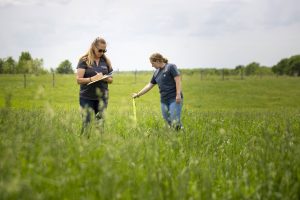
“It’s been an immediate return,” Case said. “Just in terms of the numbers of farmers and producers and even parents of youth who have been out to the farm to just drop off paperwork for 4-H, they are all getting exposure to the REEC.”
In addition to bringing more awareness to the research facilities, which allows the REEC to reach more people and producers, it provides Extension personnel like Tate with event space and opportunities for more hands-on learning.
Since the move, the facility has already hosted Farm Safety Day, an event focused on area youth who, even if their family are not farmers, are often exposed to agriculture. Other events MU Extension has hosted at the REEC include a Regional Grazing School, Linn County Extension Council meetings and 4-H project meetings.
“In Extension, we always say we are the front door of the university,” Tate said. “It’s our job to take the research done at the university and deliver it to the citizens of the state. This move has given me the opportunity to see that research first-hand and be involved in the research and be more credible when I deliver it.”